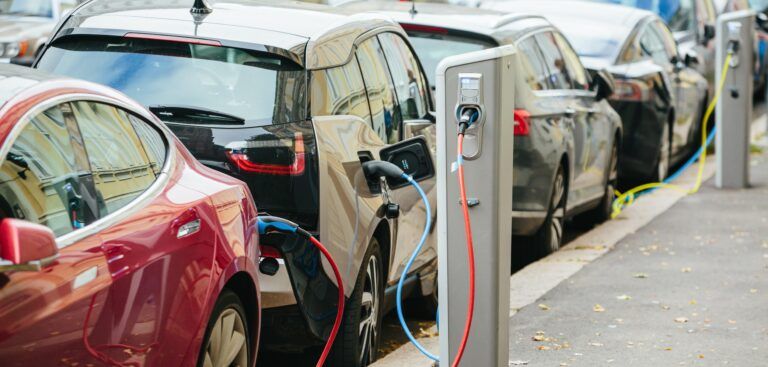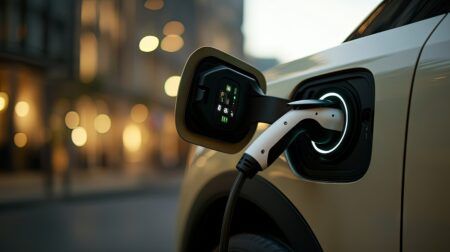The UK government has announced its intention to bring forward the ban of all new sales of petrol and diesel vehicles to 2030, which is ten years earlier than originally planned, and will have a dramatic impact on the electrified vehicle market.
As part of the government’s Green Industrial Revolution, UK Prime Minister Boris Johnson announced the plans to further accelerate the complete ban on petrol and diesel sales, which was first set at 2040, then moved to 2035, and now 2030.
The government has also announced that it will “allow the sale of hybrid cars and vans that can drive a significant distance with no carbon coming out of the tailpipe until 2035”. Although the details are yet to be confirmed, it is expected that this will primarily relate to certain plug-in hybrid electric vehicles (PHEVs) and range-extended vehicles.
The phasing out of these vehicles will play a large part of the UK’s climate change and air quality targets of net zero CO2 emissions by 2050. However, the news of the ban being brought forward will be met with celebration and trepidation as it raises questions over whether the UK’s infrastructure, suppliers and motorists will be equipped to handle the switch to alternative fuel vehicles. Experts within the electric vehicle industry have reacted to the news including battery manufacturers and EV organizations that see it as a welcome move, but also will need full support from the government to work.
The Electric Vehicle Association England welcomes the Government’s confirmed commitment to end sales of new petrol and diesel cars and vans by 2030.
Gill Nowell, director at EVA England, said:
“We welcome today’s announcement and judging by the results of our survey of electric vehicle drivers that we ran in the summer, and through our engagement with both prospective and current EV drivers, so too does the EV community in England.
“Drivers that go electric in England typically do so as they are concerned about air pollution, climate change, or want to significantly reduce their fuel costs. Regardless of their motivations going into their first purchase, the majority find that they are just great vehicles to drive.
“Whilst health, climate and affordability are vitally important parts to this debate, we also see EVs as the go to car choice for many, as they become increasingly more affordable and available.”
The UK’s ‘Ten Point Plan for a Green Industrial Revolution’ also included £1.3 billion of funding for EV charge points, grants for those buying zero or ultra-low emission vehicles, and for the development and mass-scale production of electric vehicle batteries.
Jamie Hamilton, head of electric vehicles at Deloitte, said:
“Today’s show of commitment to electric vehicles should help convince consumers that it is worth investing in the technology ahead of the 2030 deadline. With more than half of consumers already considering an EV, today’s announcement is likely to prompt an acceleration of sales. The sector is already on a sharp upward trajectory, with EV sales poised to overtake diesel imminently. As an increasingly viable option for consumers, any additional boost to the EV sector could see the sales of electric vehicles challenge petrol alternatives. However, this will only happen if consumers are convinced that the necessary charging infrastructure is in place.
“The news also has big implications for fleet operators, potentially upping the pace of change in this market. Despite the ban being a decade away, many companies will already be thinking carefully about the implications to their fleet. There are already major financial and environmental benefits associated with transitioning to electric, but any wholesale change requires careful planning around infrastructure and operating models.
“With the timeline now set, the race is on for the UK’s charging infrastructure to keep up, with capacity likely to be tested at peak times. Continued coordination with charging infrastructure planning is essential for the sustained growth of EV adoption. Consumers will need to see a joined up approach that considers how many chargers are needed, what kind of chargers are needed and what the underlying power networks look like.”
With nearly £500m of the £1.3bn set aside for battery manufacture, the government has insisted that it would collaborate with the UK motor industry to aid the mass production of electric vehicles and lithium-ion batteries that power them, but the sector is already struggling to keep up with the surge in demand.
This questions whether the country will be able to meet deadlines and have a sufficient supply of electric vehicles in less than 10 years.
Kevin Brundish, CEO at AMTE Power comments:
“This is obviously fantastic news and accelerates the electrification of cars, which is a significant step in meeting the country’s climate change targets. For businesses like ours, which are targeting the development and supply of innovative battery cell products, this continued government support, which goes alongside financial support packages such as the Faraday Industrial Strategy Challenge Fund and the Automotive Transformation Fund, will help to create the right investment environment for us to grow here in the UK. This accelerated transition to electrification will require an onshore supply chain for the electric vehicle’s most crucial component, the lithium ion battery, the creation and growth of which will also stimulate the wider economy and create much needed jobs. AMTE Power’s own manufacturing expansion plans are very much aligned with this onshore supply chain need.”
Former CEO of Aston Martin and one of the UK’s most experienced and well-known industry experts, Dr Andy Palmer has today welcomed this news as a step towards achieving a net zero carbon future and potentially reviving the UK’s automotive industry.
“If the UK is not investing in batteries and pioneering battery technology, then ultimately Britain’s car industry will decline. Creating an environment where engineers are innovating through competition is Britain’s opportunity to become a global leader in zero carbon transport.”
However, Dr Palmer, who was appointed vice chair of European technology-led battery producer InoBat in October, has warned of the potential risk of interference in the bid for net zero emissions:
“Governments’ should define the problem and let engineers innovate the solution. Too many are putting in place legislation that picks a technology winner. Those that discourage Darwinism within technology run the risk of losing out on that all-important first mover advantage.”




